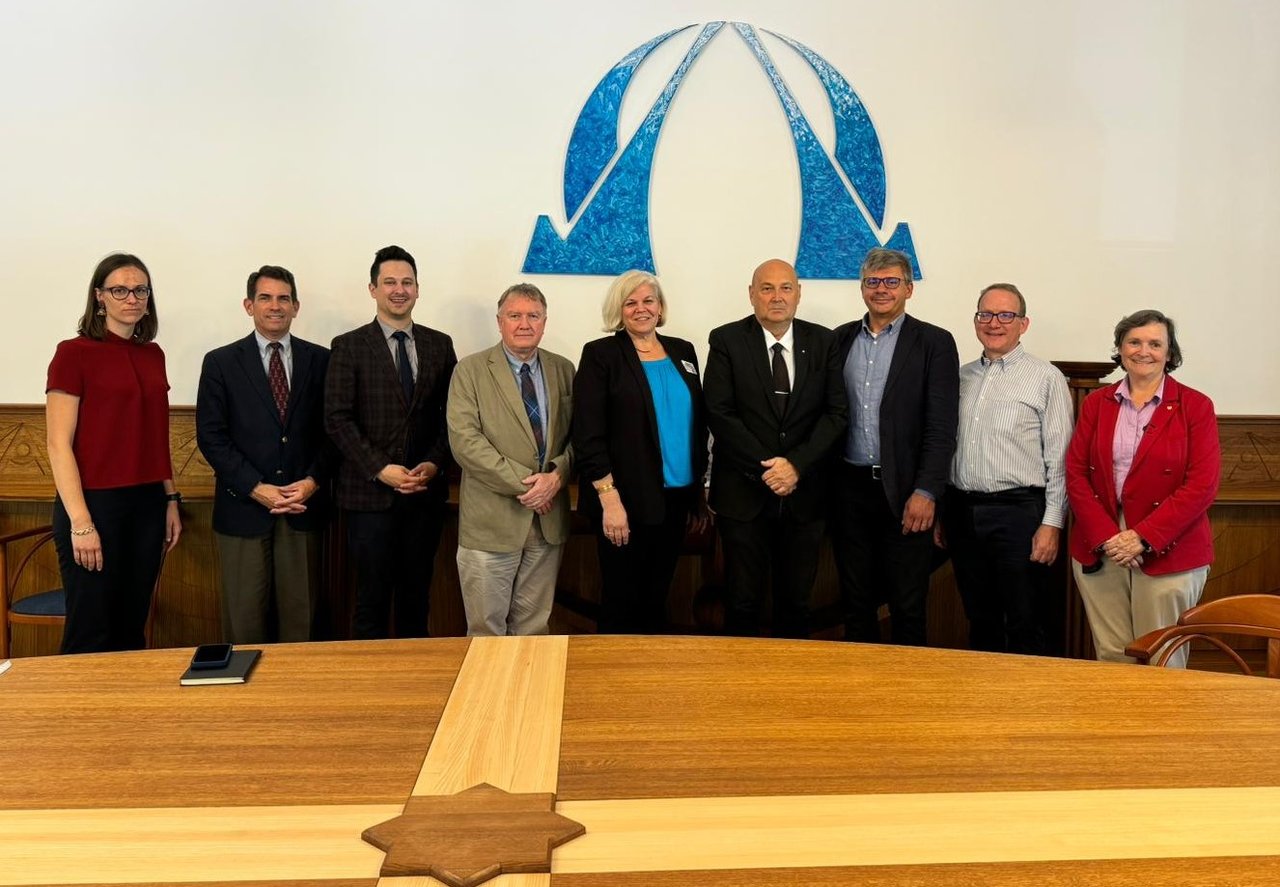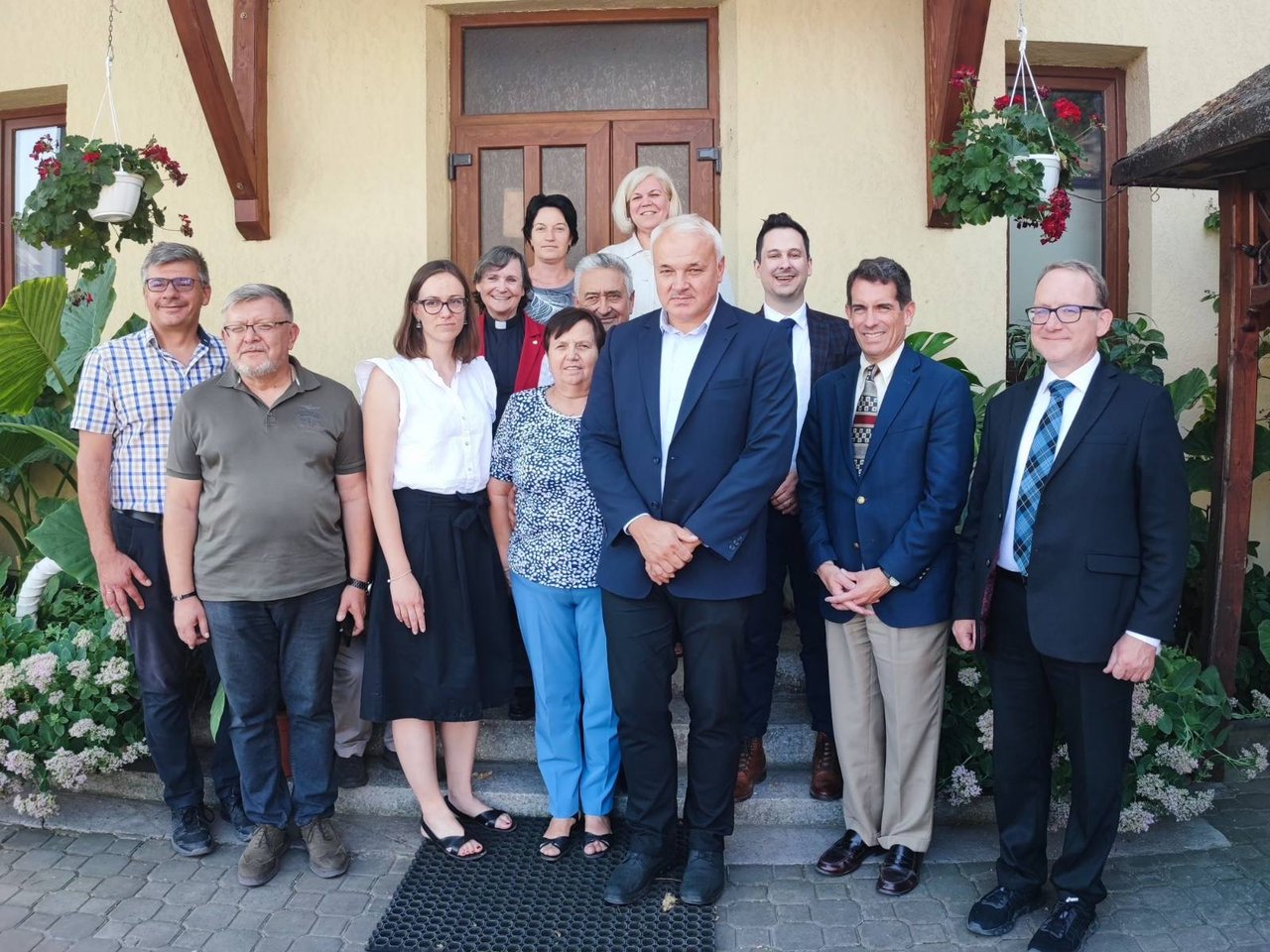International partners from the United Church of Christ and the Church of Scotland visited the Reformed Church in Hungary and the Reformed Church in Transcarpathia to meet with leaders and representatives from various churches and ministries. The visit affirmed the importance of commitment to fostering international ecumenical relationships between the churches and the support and solidarity between the partners.

Photo: Ecumenical Office, RCH
The Reformed Church in Hungary (RCH) welcomed guests from the United Church of Christ in the United States (UCC) and its refugee and migration ministry, Global H.O.P.E, and Global Ministries. Between August 30th and September 4th, the delegation met with various representatives of the RCH and the Hungarian Reformed Church Aid (HRCA) and travelled to Transcarpathia to meet the Reformed Church in Transcarpathia. The delegation began their visit in Budapest before going on to Debrecen and Transcarpathia, Ukraine, where they were joined by additional representatives from the Church of Scotland (CoS) and wrapping up back in Budapest. The UCC delegation included Associate General Minister Rev. Shari Prestemon, Andrew Long-Higgins, the Team Leader for UCC’s refugee and migration ministry Global H.O.P.E., and Dr. Peter Makari, Global Relations Minister for the Middle East and Europe for Global Ministries. The Church of Scotland was represented by Rev. Aaron Stevens of St. Columba’s Scottish Mission in Budapest, Rev. Dr Ian Alexander of the International Partnerships office of the CoS and Rev. Tara Carlewis, senior minister and CoS’s World Communion of Reformed Churches liaison officer. The United Church of Christ, Global Ministries, and the Church of Scotland are long-time partners of the Reformed Church in Hungary and the HRCA.
In Budapest, the delegation met with representatives of the Mission Department of the Synod Office of the RCH, where they received a presentation from Zoltán Levente Hajdú, head of the Mission Service office, on the office's activities and the RCH's approach to renewing the spirit of mission today. The delegation also met with Hungarian Reformed Church Aid representatives. The meeting included Gábor Nagy, the CEO of HRCA, Márton Juhász, the project development officer, and the manager for the coordination of social and donation services, Kinga Szilágyi. The leadership of the HRCA welcomed the delegation and expressed their gratitude at being able to host representatives from its international partners in the U.S. The meeting, held in both Hungarian and English, included a presentation on HRCA activities across Hungary, followed by a discussion on projects in the country and the importance of international partnerships. Following this meeting, the representatives were received by the leadership of the Refugee Ministry of the HRCA. There was a fruitful and insightful discussion on the context of migration in the country and the upcoming projects supported partly by funds from UCC and the Church of Scotland.
In Debrecen, the partners began their time with a meeting between Bishop Károly Fekete, Bishop of the Transtibiscan church district, and Rev. Dr László Gonda,vice-rector of the Reformed Theological University of Debrecen and associate professor of Mission Studies in addition to being responsible for ecumenical relations in the Trastibiscan Church District. Following the conversation, there was a visit to a local church in the city centre called the Red Church (Verestemplom). The group discussed church revitalisation and renewal with a church pastor, Veronika Tóth-Mihala. The delegation also visited the Great Church in Debrecen, where they met Pastor István Oláh, a pastor at the Great Church, who gave a brief presentation on the history of Hungary, the Great Church, and the reformed tradition in Hungary. The international guests also attended the Sunday service in another Reformed congregation in Debrecen, where the local pastor, Endre Iszlai, also gave an overview about the ministries of the community, especially the kindergarten run by their congregation.

Photo: Ecumenical Office, RCH
In Transcarpathia, the group had the opportunity to attend a worship service for the Reformed schools celebrating the opening of the new school year where Bishop Zán-Fábián preached on how the new academic year can be a fresh start in our relationship with God in which we are all invited to learn and be transformed. This is also the source of energy for Christians in uncertain and frightening times. At this service, the guests from UCC were officially welcomed, and Rev. Shari Prestemon delivered a short greeting in which she emphasised that we are all part of the same body in Christ.
Following the festivities, the delegation met with a group of pastors and congregants at the local church. The discussion focused on the current situation, including challenges and opportunities for the community. The lack of people was named as the biggest challenge, and the strength of belonging to a community and the strength of the encouragement found in the Bible were mentioned as the most important factors in uncertain times. The diverse ministry of the Beregszász church was presented, including youth ministry, hospital chaplaincy, diaconal services, foster children's foundation, and more.
On September 2nd, the group travelled to Mezővári to learn about different projects in the city, including a visit to the Nefelejcs (forget-me-not) Home for children with disabilities, a Roma kindergarten and afterschool, participation at the food distribution for children in the Roma settlement. Bishop Zán-Fábián joined this program, giving the opportunity for an in-depth discussion about the church's past and present, as well as the future development plans.
Following the visits in Mezővári, the group travelled to Beregszász where they were joined by Rev. Dr. Ian Alexander and Rev. Tara Carlewis of the Church of Scotland. Here, the delegation met with two pastors and their families. One of the pastors is responsible for hospital chaplaincy, and the other for youth ministry. This discussion dove deeper into the challenges and opportunities facing pastors and their church communities. It reflected on how the war affected church life, the different ministries, and what pastors can do to serve their communities. Later on, the discussion continued, joined by Bishop Zán Fábián and several members of the church board. On their last morning in Transcarpathia, the delegation visited the Diaconal Coordination Office and received a presentation on their projects. This visit included a meeting with representatives of the regional government responsible for church relations wherein they recognised the role and significance of the service of the RCT. It was also emphasised that the church can be a foundation for the communities, and pastors play an important role in sustaining the community.
Upon returning to Budapest, the delegation visited St. Columba’s Church, an English-speaking congregation where Rev. Aaron Stevens is the pastor. Here, the delegation met with representatives of the Orthodox Church of Ukraine and other Ukrainian Christian communities, who shared their activities, views and visions. Both communities hold their worship services at the Scottish Mission.
On the final day of their visit, the delegation met with Dr Tamás Kodácsy, who gave an overview of the eco-congregation movement and its theological background within the RCH. Here, Dr Kodácsy highlighted the importance of the CoS as a role model for this project, and the delegation identified some common ground between the visions of the UCC, CoS, and RCH communities on eco-congregation work. Next, the group met with Bishop József, who thanked the international partners for their support and solidarity and gave an overview of the RCH's situation and his vision for the future.
The delegation also met with Rev. Szabina Sztojka, the head of the Roma Ministry, and received an overview of the Roma community in Hungary as well as the goals of the Roma Ministry, including the challenges and blessings they face in their ministry. The final meeting for the delegation was with the Women’s Association of the RCH. They were joined by the president of the association, who gave a presentation about their diverse work. The president emphasised women's key role in the Reformed congregations and discussed how the association is involved in several diaconal ministries.